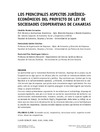Please use this identifier to cite or link to this item:
https://accedacris.ulpgc.es/jspui/handle/10553/55241
| Title: | Los principales aspectos jurídico-económicos del proyecto de Ley de Sociedades Cooperativas de Canarias | Other Titles: | The main legal and economic issues of the Canarian Cooperative Societies bill | Authors: | Román Cervantes, Cándido A. Galván-Sánchez, Inmaculada Domínguez Cabrera, María del Pino |
UNESCO Clasification: | 56 Ciencias jurídicas y derecho | Keywords: | Economía social Cooperativa Estructura social Aspectos económicos Clases de cooperativas |
Issue Date: | 2018 | Journal: | CIRIEC España. Revista jurídica de economía social y cooperativa | Abstract: | La oportunidad que la Comunidad Autónoma de Canarias, disponga de su propia Ley de Cooperativas es algo que en los últimos años ha suscitado un interesante debate entre los expertos en el ámbito empresarial y jurídico. Hay opiniones que insisten que la Ley Nacional es lo suficientemente oportuna, y eficiente, en términos de favorecer la creación de este tipo de empresa, que quizás sería conveniente seguir aplicándola. Por otra parte, cada vez un mayor número de expertos propugnan la necesidad urgente que Canarias tenga su propia normativa.
Con este trabajo pretendemos argumentar la necesidad que el archipiélago disponga de su propia legislación, más aún si se tienen en cuenta las características del territorio, sus condicionantes medioambientales, humanos, sociales, así como la especial rigidez de su mercado de trabajo. Un territorio frágil y fragmentado, debe tener su reflejo en un texto que sea clave en la dinamización de las relaciones laborales y en la facilidad para la creación de cooperativas. Canarias necesita impulsar acciones que deriven en el fomento del autoempleo. The opportunity for the Autonomous Community of the Canary Islands to have its own Cooperatives Law is something that in recent years has provoked an interesting debate between experts in business and legal. There are opinions that insist that the National Law is sufficiently timely, and efficient because it stimulate the creation of this type of company. In that sense, it is better to continue applying it. On the other hand, more and more experts advocate the urgent need for the Canary Islands to have its own rules. With this work we intend to argue the need for the archipelago to have its own legislation, even more so if the characteristics of the territory, its environmental, human and social conditions are taken into account, as well as the special rigidity of its labour market. A fragile and fragmented territory must have its reflection in a text that is a key in the dynamization of labour relations and in the facility for the creation of cooperatives. The Canary Islands needs to promote actions that lead to the promotion of self-employment. |
URI: | https://accedacris.ulpgc.es/handle/10553/55241 | ISSN: | 1577-4430 | Source: | CIRIEC España. Revista jurídica de economía social y cooperativa [ISSN 1577-4430], n. 32, p. 9-36 |
| Appears in Collections: | Artículos |
Page view(s) 5
168
checked on Jan 10, 2026
Download(s)
224
checked on Jan 10, 2026
Google ScholarTM
Check
Share
Export metadata
Items in accedaCRIS are protected by copyright, with all rights reserved, unless otherwise indicated.
